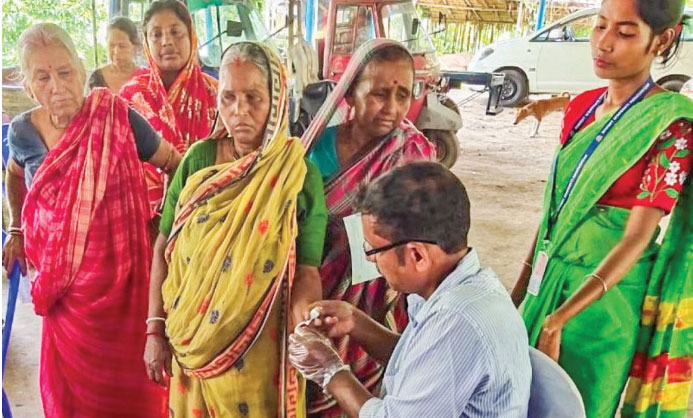It is sad that several rural women cannot differentiate a normal period from an abnormal one. They have no idea how long a period lasts. Many of them bleed for months not knowing that they have a problem in their uterus. Losing so much blood makes them anaemic, triggering various other health issues, says Dr Aruna Tantia, a gynaecologist and member of RC Salt Lake Metropolitan, RID 3291.

The club, through its project Matri Raksha (saving women), has embarked on an awareness and treatment drive to address 20,000 women in the district with $140,000 global grant support from TRF and Rotary clubs from Switzerland. Though the project was begun three years ago, it had to be paused during the Covid pandemic.
The club, along with its RCCs and other NGOs, has conducted 26 special camps until August, in various pockets of Bengal, stretching from the Sundarbans to Nadia and Bankura. “We have so far screened 2,600 women in these camps,” says Aruna. Twelve Rotarian-doctors from the Swiss clubs, and TRF’s technical cadre members had also participated in some of the camps.
“About 80 per cent women had severe anaemia with the blood count alarmingly low at 4–5 units (the normal index is 12). Around 250 women had issues in the uterus, resulting in blood loss,” she says. The club is extending surgical care for those diagnosed with tumour. Deworming tablets and vitamin supplements were distributed at these camps, and women were educated on the importance of a nutritious diet.
Utilising local resources, like the iron-rich Kulekhara (swamp weed) plant, has been a key strategy to combat anaemia. “I prescribe the recipe to all my patients. The leaves are to be boiled and made into a soup. Consuming it daily for a fortnight is a sure shot to increase the haemoglobin levels,” explains the gynaecologist. She points out that the tribals enjoyed better health “because they knew the value of the herbs they had in their backyard.”
The services at the camp extended beyond anaemia treatment to overall health, addressing issues related to eyes, bones and dental health, all thanks to the seven doctors of the club practising various disciplines. The club also upgraded the rural PHCs with better screening facilities, and trained the health workers. “We even set up a PHC for a cluster of five villages in the Sundarbans where medical help is totally absent. The nearest clinic is 30km away,” she says.
Six months after the initial camps, the women were evaluated again, and “to our joy, most of them have been cured of the disorder. Not only are these women now aware of healthy eating, they are also spreading the word about it among their neighbours.” The camps also served to educate the villagers about handwashing, safe drinking water and menstrual hygiene. DG Hira Lal Yadav has made Matri Raksha a district project and Aruna is confident of achieving significant success in the district in the next 3–5 years. “I will be happy when women learn to understand a normal period and make a healthy diet with food from her kitchen shelf,” she smiles.





